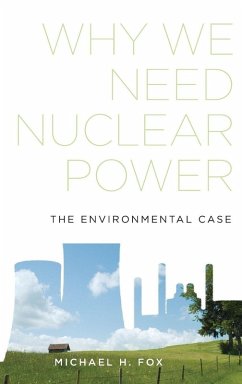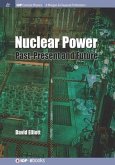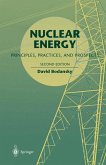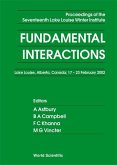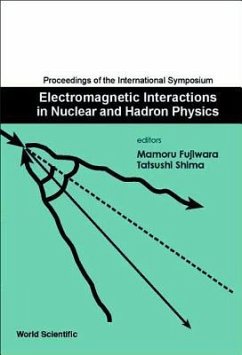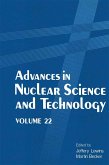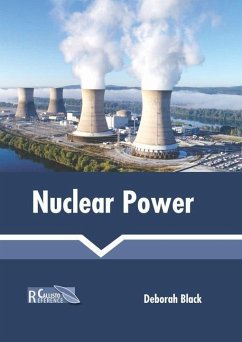- Gebundenes Buch
- Merkliste
- Auf die Merkliste
- Bewerten Bewerten
- Teilen
- Produkt teilen
- Produkterinnerung
- Produkterinnerung
An argument for nuclear power as an environmentally sound option, based on real science and written by a radiation biologist. A complete scientific analysis of nuclear power.
Andere Kunden interessierten sich auch für
![Nuclear Power Nuclear Power]() David ElliottNuclear Power131,99 €
David ElliottNuclear Power131,99 €![Why Trust a Theory? Why Trust a Theory?]() Why Trust a Theory?111,99 €
Why Trust a Theory?111,99 €![Nuclear Energy Nuclear Energy]() David BodanskyNuclear Energy165,99 €
David BodanskyNuclear Energy165,99 €![Fundamental Interactions - Proceedings of the Seventeenth Lake Louise Winter Institute Fundamental Interactions - Proceedings of the Seventeenth Lake Louise Winter Institute]() Fundamental Interactions - Proceedings of the Seventeenth Lake Louise Winter Institute251,99 €
Fundamental Interactions - Proceedings of the Seventeenth Lake Louise Winter Institute251,99 €![Electromagnetic Interactions in Nuclear and Hadron Physics, Proceedings of the International Symposium Electromagnetic Interactions in Nuclear and Hadron Physics, Proceedings of the International Symposium]() Electromagnetic Interactions in Nuclear and Hadron Physics, Proceedings of the International Symposium273,99 €
Electromagnetic Interactions in Nuclear and Hadron Physics, Proceedings of the International Symposium273,99 €![Advances in Nuclear Science and Technology Advances in Nuclear Science and Technology]() Jeffery D LewinsAdvances in Nuclear Science and Technology60,99 €
Jeffery D LewinsAdvances in Nuclear Science and Technology60,99 €![Nuclear Power Nuclear Power]() Nuclear Power154,99 €
Nuclear Power154,99 €-
-
-
An argument for nuclear power as an environmentally sound option, based on real science and written by a radiation biologist. A complete scientific analysis of nuclear power.
Hinweis: Dieser Artikel kann nur an eine deutsche Lieferadresse ausgeliefert werden.
Hinweis: Dieser Artikel kann nur an eine deutsche Lieferadresse ausgeliefert werden.
Produktdetails
- Produktdetails
- Verlag: Oxford University Press
- Seitenzahl: 320
- Erscheinungstermin: 1. April 2014
- Englisch
- Abmessung: 236mm x 157mm x 23mm
- Gewicht: 567g
- ISBN-13: 9780199344574
- ISBN-10: 0199344574
- Artikelnr.: 40304724
- Herstellerkennzeichnung
- Libri GmbH
- Europaallee 1
- 36244 Bad Hersfeld
- gpsr@libri.de
- Verlag: Oxford University Press
- Seitenzahl: 320
- Erscheinungstermin: 1. April 2014
- Englisch
- Abmessung: 236mm x 157mm x 23mm
- Gewicht: 567g
- ISBN-13: 9780199344574
- ISBN-10: 0199344574
- Artikelnr.: 40304724
- Herstellerkennzeichnung
- Libri GmbH
- Europaallee 1
- 36244 Bad Hersfeld
- gpsr@libri.de
Michael H. Fox is Emeritus Professor in the Department of Environmental and Radiological Health Sciences at Colorado State University. He has been a radiation biologist for 35 years.
* Table of Contents
* Introduction
* Part 1 Global Warming and Energy Production
* 1 Global climate change: Real or myth?
* What is the debate about?
* The IPCC and International Conventions
* The greenhouse effect
* Skeptical politicians and pundits
* Skeptical scientists
* Historical temperature and greenhouse gas record
* Last 10,000 years of climate - the Holocene
* Recent changes in temperature and CO2
* Melting glaciers and rising seas
* Models
* Response to Singer and Avery
* Predictions of future global warming and consequences
* Sea level and acidification
* Global weirding
* 2 Where our Energy Comes From
* A brief history of energy
* Coal
* Oil and natural gas
* Uranium
* How much energy do we use and where does it come from?
* World energy usage
* What can be done to reduce our carbon-intensive energy economy?
* 3 The Good, Bad and Ugly of Coal and Gas
* Coal
* Anatomy of a coal-fired plant
* Carbon dioxide emissions and other pollutants
* Mining and health hazards
* How much is there? 50
* Carbon Capture and Storage
* Natural Gas
* How much is there?
* Greenhouse gas emissions
* Fracking
* 4 The Siren song of renewable energy
* Solar
* Photovoltaic (PV) solar power
* Concentrated Solar Power (CSP)
* Solar heating
* Limitations of solar power
* Wind
* Limitations of Wind Power
* Summary
* 5 Back to the Future: Nuclear Power
* Anatomy of a reactor
* Advantages of nuclear power
* Baseload power 82
* Greenhouse gas emission
* Location and footprint
* Cost
* Subsidies for nuclear and renewables
* Advanced Reactor Technology
* Can nuclear replace coal?
* Arguments against nuclear power
* Part 2 Radiation and its Biological Effects
* 6 The world of the atom
* What is radiation?
* Black body radiation - the quantum
* The nuclear atom
* The quantum atom
* The nucleus
* Radioactivity: decay processes
* Fission
* Summary
* 7 How dangerous is radiation?
* Interactions of Radiation with Matter
* Electromagnetic radiation (photon) interactions
* Charged particle interactions
* Neutron interactions
* What is a dose of radiation?
* Effects of radiation on DNA and cells
* How does radiation cause cancer?
* What are the risks?
* Death from radiation
* Cancer from radiation
* Hereditary effects of radiation
* How bad is plutonium?
* Summing up
* 8 What comes naturally and not so naturally
* Natural Background Radiation
* Cosmic radiation
* Primordial terrestrial radiation
* Medical exposure
* Part 3 Risks of Nuclear Power
* 9 Nuclear Waste
* What is nuclear waste?
* The long and the short of waste storage
* Yucca Mountain
* Waste Isolation Pilot Plant (WIPP)
* Recycling spent nuclear fuel
* Making new fuel from recycled "waste"
* Summing up
* 10 About those accidents
* The Scare, March 16, 1979
* Three Mile Island, March 28, 1979
* How the accident happened
* Consequences of TMI
* Chernobyl, April 26, 1986
* How the accident happened
* The hazardous radioisotopes
* Health consequences
* Environmental consequences
* A trip to Chernobyl
* Consequences for nuclear power
* Fukushima, March 11, 2011
* How the accident happened
* Health and environmental consequences
* Consequences for nuclear power
* Public perception of risks from nuclear power
* 11 The Quest for Uranium
* Mining for uranium
* Shinkolobwe
* Shiprock
* Milling
* In Situ Recovery
* Enrichment
* Fuel fabrication
* World resources of uranium
* Megatons to Megawatts
* Is there enough uranium for a nuclear renaissance?
* Breeder reactors
* Thorium
* Summary
* 12 Now What?
* Myth 1: Radiation is extremely dangerous and we don't understand it
* Myth 2: There is no solution to the nuclear waste produced by nuclear
power
* Myth 3: Nuclear power is unsafe and nuclear accidents have killed
hundreds of thousands of people
* Myth 4: Uranium will run out too soon and mining it generates so much
carbon dioxide that it loses its carbon-free advantage
* Myth 5: Nuclear power is so expensive it can't survive in the
marketplace
* Afterword
* Appendix A: Global warming
* Earth's energy balance:
* Radiative forcing
* The emission scenarios of the IPCC special report on emissions
scenarios (SRES)
* Appendix B Glossary of terms, definitions and units
* Appendix C Glossary of acronyms and abbreviations
* Appendix D Selected Nobel prizes
* Index
* Introduction
* Part 1 Global Warming and Energy Production
* 1 Global climate change: Real or myth?
* What is the debate about?
* The IPCC and International Conventions
* The greenhouse effect
* Skeptical politicians and pundits
* Skeptical scientists
* Historical temperature and greenhouse gas record
* Last 10,000 years of climate - the Holocene
* Recent changes in temperature and CO2
* Melting glaciers and rising seas
* Models
* Response to Singer and Avery
* Predictions of future global warming and consequences
* Sea level and acidification
* Global weirding
* 2 Where our Energy Comes From
* A brief history of energy
* Coal
* Oil and natural gas
* Uranium
* How much energy do we use and where does it come from?
* World energy usage
* What can be done to reduce our carbon-intensive energy economy?
* 3 The Good, Bad and Ugly of Coal and Gas
* Coal
* Anatomy of a coal-fired plant
* Carbon dioxide emissions and other pollutants
* Mining and health hazards
* How much is there? 50
* Carbon Capture and Storage
* Natural Gas
* How much is there?
* Greenhouse gas emissions
* Fracking
* 4 The Siren song of renewable energy
* Solar
* Photovoltaic (PV) solar power
* Concentrated Solar Power (CSP)
* Solar heating
* Limitations of solar power
* Wind
* Limitations of Wind Power
* Summary
* 5 Back to the Future: Nuclear Power
* Anatomy of a reactor
* Advantages of nuclear power
* Baseload power 82
* Greenhouse gas emission
* Location and footprint
* Cost
* Subsidies for nuclear and renewables
* Advanced Reactor Technology
* Can nuclear replace coal?
* Arguments against nuclear power
* Part 2 Radiation and its Biological Effects
* 6 The world of the atom
* What is radiation?
* Black body radiation - the quantum
* The nuclear atom
* The quantum atom
* The nucleus
* Radioactivity: decay processes
* Fission
* Summary
* 7 How dangerous is radiation?
* Interactions of Radiation with Matter
* Electromagnetic radiation (photon) interactions
* Charged particle interactions
* Neutron interactions
* What is a dose of radiation?
* Effects of radiation on DNA and cells
* How does radiation cause cancer?
* What are the risks?
* Death from radiation
* Cancer from radiation
* Hereditary effects of radiation
* How bad is plutonium?
* Summing up
* 8 What comes naturally and not so naturally
* Natural Background Radiation
* Cosmic radiation
* Primordial terrestrial radiation
* Medical exposure
* Part 3 Risks of Nuclear Power
* 9 Nuclear Waste
* What is nuclear waste?
* The long and the short of waste storage
* Yucca Mountain
* Waste Isolation Pilot Plant (WIPP)
* Recycling spent nuclear fuel
* Making new fuel from recycled "waste"
* Summing up
* 10 About those accidents
* The Scare, March 16, 1979
* Three Mile Island, March 28, 1979
* How the accident happened
* Consequences of TMI
* Chernobyl, April 26, 1986
* How the accident happened
* The hazardous radioisotopes
* Health consequences
* Environmental consequences
* A trip to Chernobyl
* Consequences for nuclear power
* Fukushima, March 11, 2011
* How the accident happened
* Health and environmental consequences
* Consequences for nuclear power
* Public perception of risks from nuclear power
* 11 The Quest for Uranium
* Mining for uranium
* Shinkolobwe
* Shiprock
* Milling
* In Situ Recovery
* Enrichment
* Fuel fabrication
* World resources of uranium
* Megatons to Megawatts
* Is there enough uranium for a nuclear renaissance?
* Breeder reactors
* Thorium
* Summary
* 12 Now What?
* Myth 1: Radiation is extremely dangerous and we don't understand it
* Myth 2: There is no solution to the nuclear waste produced by nuclear
power
* Myth 3: Nuclear power is unsafe and nuclear accidents have killed
hundreds of thousands of people
* Myth 4: Uranium will run out too soon and mining it generates so much
carbon dioxide that it loses its carbon-free advantage
* Myth 5: Nuclear power is so expensive it can't survive in the
marketplace
* Afterword
* Appendix A: Global warming
* Earth's energy balance:
* Radiative forcing
* The emission scenarios of the IPCC special report on emissions
scenarios (SRES)
* Appendix B Glossary of terms, definitions and units
* Appendix C Glossary of acronyms and abbreviations
* Appendix D Selected Nobel prizes
* Index
* Table of Contents
* Introduction
* Part 1 Global Warming and Energy Production
* 1 Global climate change: Real or myth?
* What is the debate about?
* The IPCC and International Conventions
* The greenhouse effect
* Skeptical politicians and pundits
* Skeptical scientists
* Historical temperature and greenhouse gas record
* Last 10,000 years of climate - the Holocene
* Recent changes in temperature and CO2
* Melting glaciers and rising seas
* Models
* Response to Singer and Avery
* Predictions of future global warming and consequences
* Sea level and acidification
* Global weirding
* 2 Where our Energy Comes From
* A brief history of energy
* Coal
* Oil and natural gas
* Uranium
* How much energy do we use and where does it come from?
* World energy usage
* What can be done to reduce our carbon-intensive energy economy?
* 3 The Good, Bad and Ugly of Coal and Gas
* Coal
* Anatomy of a coal-fired plant
* Carbon dioxide emissions and other pollutants
* Mining and health hazards
* How much is there? 50
* Carbon Capture and Storage
* Natural Gas
* How much is there?
* Greenhouse gas emissions
* Fracking
* 4 The Siren song of renewable energy
* Solar
* Photovoltaic (PV) solar power
* Concentrated Solar Power (CSP)
* Solar heating
* Limitations of solar power
* Wind
* Limitations of Wind Power
* Summary
* 5 Back to the Future: Nuclear Power
* Anatomy of a reactor
* Advantages of nuclear power
* Baseload power 82
* Greenhouse gas emission
* Location and footprint
* Cost
* Subsidies for nuclear and renewables
* Advanced Reactor Technology
* Can nuclear replace coal?
* Arguments against nuclear power
* Part 2 Radiation and its Biological Effects
* 6 The world of the atom
* What is radiation?
* Black body radiation - the quantum
* The nuclear atom
* The quantum atom
* The nucleus
* Radioactivity: decay processes
* Fission
* Summary
* 7 How dangerous is radiation?
* Interactions of Radiation with Matter
* Electromagnetic radiation (photon) interactions
* Charged particle interactions
* Neutron interactions
* What is a dose of radiation?
* Effects of radiation on DNA and cells
* How does radiation cause cancer?
* What are the risks?
* Death from radiation
* Cancer from radiation
* Hereditary effects of radiation
* How bad is plutonium?
* Summing up
* 8 What comes naturally and not so naturally
* Natural Background Radiation
* Cosmic radiation
* Primordial terrestrial radiation
* Medical exposure
* Part 3 Risks of Nuclear Power
* 9 Nuclear Waste
* What is nuclear waste?
* The long and the short of waste storage
* Yucca Mountain
* Waste Isolation Pilot Plant (WIPP)
* Recycling spent nuclear fuel
* Making new fuel from recycled "waste"
* Summing up
* 10 About those accidents
* The Scare, March 16, 1979
* Three Mile Island, March 28, 1979
* How the accident happened
* Consequences of TMI
* Chernobyl, April 26, 1986
* How the accident happened
* The hazardous radioisotopes
* Health consequences
* Environmental consequences
* A trip to Chernobyl
* Consequences for nuclear power
* Fukushima, March 11, 2011
* How the accident happened
* Health and environmental consequences
* Consequences for nuclear power
* Public perception of risks from nuclear power
* 11 The Quest for Uranium
* Mining for uranium
* Shinkolobwe
* Shiprock
* Milling
* In Situ Recovery
* Enrichment
* Fuel fabrication
* World resources of uranium
* Megatons to Megawatts
* Is there enough uranium for a nuclear renaissance?
* Breeder reactors
* Thorium
* Summary
* 12 Now What?
* Myth 1: Radiation is extremely dangerous and we don't understand it
* Myth 2: There is no solution to the nuclear waste produced by nuclear
power
* Myth 3: Nuclear power is unsafe and nuclear accidents have killed
hundreds of thousands of people
* Myth 4: Uranium will run out too soon and mining it generates so much
carbon dioxide that it loses its carbon-free advantage
* Myth 5: Nuclear power is so expensive it can't survive in the
marketplace
* Afterword
* Appendix A: Global warming
* Earth's energy balance:
* Radiative forcing
* The emission scenarios of the IPCC special report on emissions
scenarios (SRES)
* Appendix B Glossary of terms, definitions and units
* Appendix C Glossary of acronyms and abbreviations
* Appendix D Selected Nobel prizes
* Index
* Introduction
* Part 1 Global Warming and Energy Production
* 1 Global climate change: Real or myth?
* What is the debate about?
* The IPCC and International Conventions
* The greenhouse effect
* Skeptical politicians and pundits
* Skeptical scientists
* Historical temperature and greenhouse gas record
* Last 10,000 years of climate - the Holocene
* Recent changes in temperature and CO2
* Melting glaciers and rising seas
* Models
* Response to Singer and Avery
* Predictions of future global warming and consequences
* Sea level and acidification
* Global weirding
* 2 Where our Energy Comes From
* A brief history of energy
* Coal
* Oil and natural gas
* Uranium
* How much energy do we use and where does it come from?
* World energy usage
* What can be done to reduce our carbon-intensive energy economy?
* 3 The Good, Bad and Ugly of Coal and Gas
* Coal
* Anatomy of a coal-fired plant
* Carbon dioxide emissions and other pollutants
* Mining and health hazards
* How much is there? 50
* Carbon Capture and Storage
* Natural Gas
* How much is there?
* Greenhouse gas emissions
* Fracking
* 4 The Siren song of renewable energy
* Solar
* Photovoltaic (PV) solar power
* Concentrated Solar Power (CSP)
* Solar heating
* Limitations of solar power
* Wind
* Limitations of Wind Power
* Summary
* 5 Back to the Future: Nuclear Power
* Anatomy of a reactor
* Advantages of nuclear power
* Baseload power 82
* Greenhouse gas emission
* Location and footprint
* Cost
* Subsidies for nuclear and renewables
* Advanced Reactor Technology
* Can nuclear replace coal?
* Arguments against nuclear power
* Part 2 Radiation and its Biological Effects
* 6 The world of the atom
* What is radiation?
* Black body radiation - the quantum
* The nuclear atom
* The quantum atom
* The nucleus
* Radioactivity: decay processes
* Fission
* Summary
* 7 How dangerous is radiation?
* Interactions of Radiation with Matter
* Electromagnetic radiation (photon) interactions
* Charged particle interactions
* Neutron interactions
* What is a dose of radiation?
* Effects of radiation on DNA and cells
* How does radiation cause cancer?
* What are the risks?
* Death from radiation
* Cancer from radiation
* Hereditary effects of radiation
* How bad is plutonium?
* Summing up
* 8 What comes naturally and not so naturally
* Natural Background Radiation
* Cosmic radiation
* Primordial terrestrial radiation
* Medical exposure
* Part 3 Risks of Nuclear Power
* 9 Nuclear Waste
* What is nuclear waste?
* The long and the short of waste storage
* Yucca Mountain
* Waste Isolation Pilot Plant (WIPP)
* Recycling spent nuclear fuel
* Making new fuel from recycled "waste"
* Summing up
* 10 About those accidents
* The Scare, March 16, 1979
* Three Mile Island, March 28, 1979
* How the accident happened
* Consequences of TMI
* Chernobyl, April 26, 1986
* How the accident happened
* The hazardous radioisotopes
* Health consequences
* Environmental consequences
* A trip to Chernobyl
* Consequences for nuclear power
* Fukushima, March 11, 2011
* How the accident happened
* Health and environmental consequences
* Consequences for nuclear power
* Public perception of risks from nuclear power
* 11 The Quest for Uranium
* Mining for uranium
* Shinkolobwe
* Shiprock
* Milling
* In Situ Recovery
* Enrichment
* Fuel fabrication
* World resources of uranium
* Megatons to Megawatts
* Is there enough uranium for a nuclear renaissance?
* Breeder reactors
* Thorium
* Summary
* 12 Now What?
* Myth 1: Radiation is extremely dangerous and we don't understand it
* Myth 2: There is no solution to the nuclear waste produced by nuclear
power
* Myth 3: Nuclear power is unsafe and nuclear accidents have killed
hundreds of thousands of people
* Myth 4: Uranium will run out too soon and mining it generates so much
carbon dioxide that it loses its carbon-free advantage
* Myth 5: Nuclear power is so expensive it can't survive in the
marketplace
* Afterword
* Appendix A: Global warming
* Earth's energy balance:
* Radiative forcing
* The emission scenarios of the IPCC special report on emissions
scenarios (SRES)
* Appendix B Glossary of terms, definitions and units
* Appendix C Glossary of acronyms and abbreviations
* Appendix D Selected Nobel prizes
* Index

